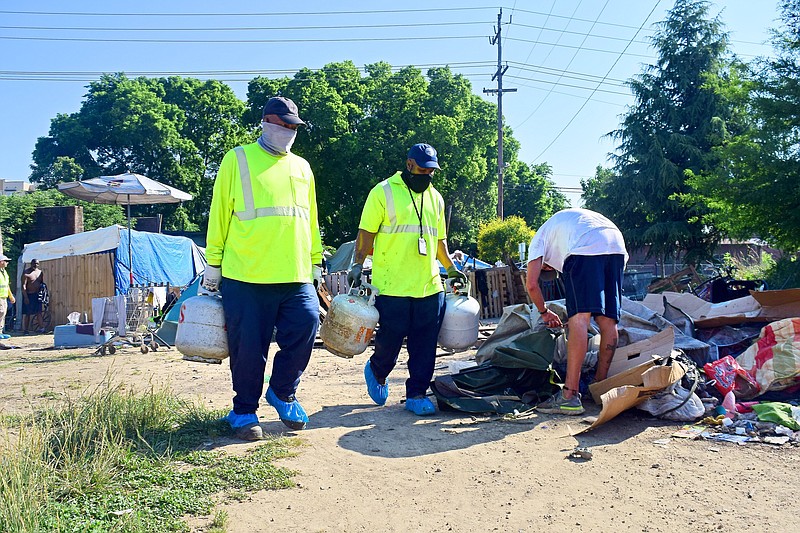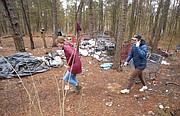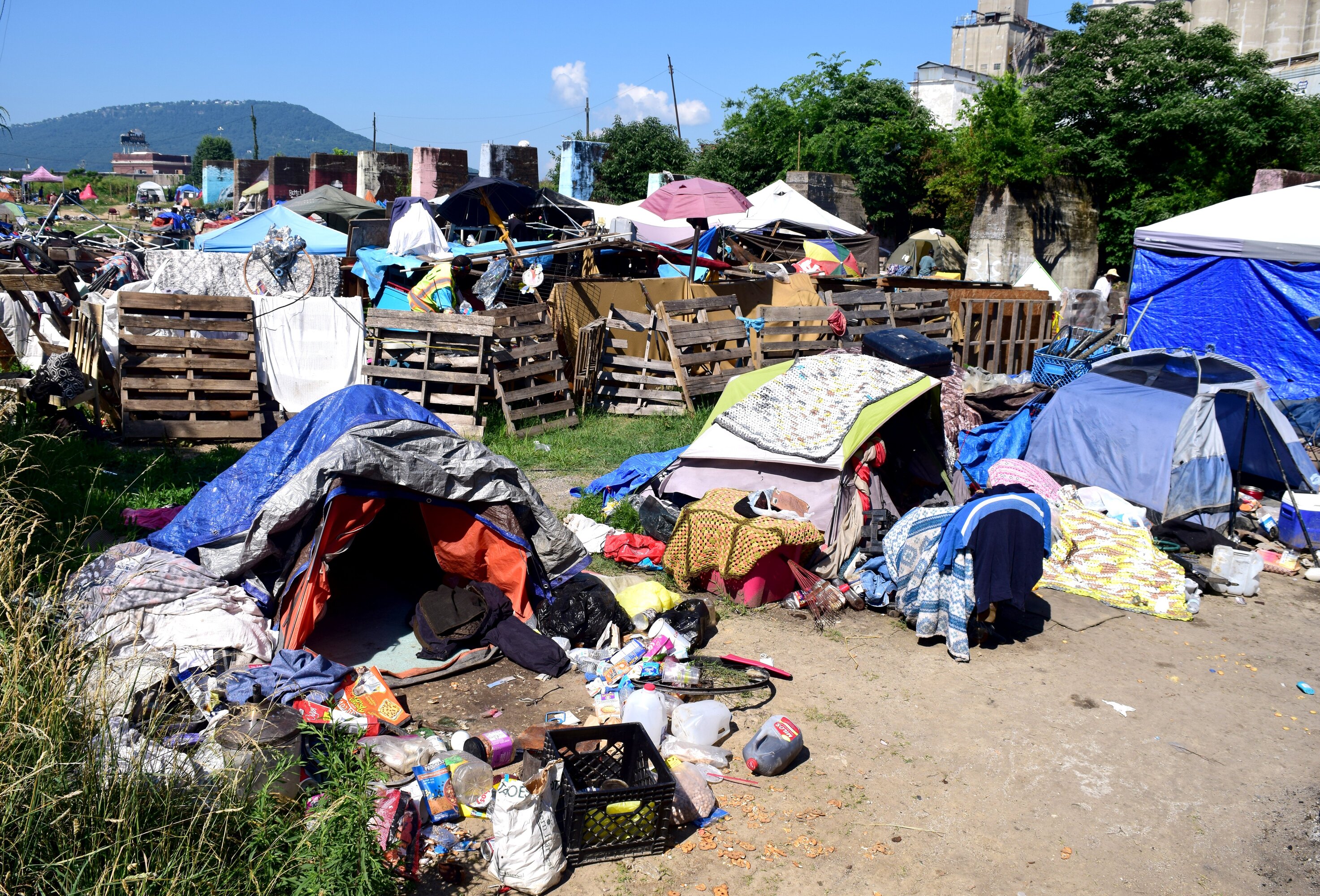After seeing the numbers spike during the pandemic, Chattanooga officials are celebrating a 31% reduction in Hamilton County's homeless population — a decrease that leaders say resulted from an influx of federal funding and a restructured approach to addressing the issue.
According to data from a January count, the number of sheltered and unsheltered homeless people in Hamilton County decreased from 1,144 in 2022 to 785 in 2023. The latest tally includes 44 children, 50 veterans and 59 domestic violence survivors.
"For any mayor, homelessness is kind of the most wicked problem we face — the most Sisyphean thing we face," Chattanooga Mayor Tim Kelly said in an interview with local news outlets Monday. "I ran during COVID, came into office during COVID, and it was the thing that as much as anything kept me up at night."
Chattanooga experienced "one of the largest increases in homelessness in the nation" during the pandemic, Richard Cho, a senior adviser at the U.S. Department of Housing and Urban Development, said at a Wednesday news conference.
(READ MORE: Chattanooga groups kick off annual census of homeless, hope to see population stabilize)
The number of unsheltered people in Hamilton County dropped from 1,008 to 607 in 2022, a 39.8% decrease, according to the Chattanooga Regional Homeless Coalition and its partner agencies.
"This shouldn't be us spiking a football because there's still far too many homeless out there," Kelly said, "but it does indicate real momentum and that what we're doing is working."
Hamilton County's homeless population grew during the pandemic, jumping from 364 unsheltered people in 2021 to 1,008 in 2022. Numbers kept by the Chattanooga Regional Homeless Coalition show there were 648 sheltered and unsheltered people tallied across the 11-county region in 2020.
There is a myth in Chattanooga that many of the city's unsheltered people came from outside the area in recent years, Mike Smith, the executive director of the Chattanooga Regional Homeless Coalition, said at Wednesday's conference.
"That myth is not unique to Chattanooga, every city has battled that myth," Smith said. "People aren't coming here to live in the streets ... even if they do come here, they're human. We're going to get them back into housing."
A city spokesperson said in a text that data is not broken down by county prior to 2021. In 2021, there were 579 sheltered and unsheltered homeless people in Hamilton County.
The point-in-time count measures the number of people experiencing homelessness on a single night, but the coalition opted to hold it over the course of a week to ensure the data captured as many people as possible.
Smith said in an interview that Hamilton County's decrease in 2023 surpasses a goal set by the federal government to reduce the unsheltered homeless population 25% by 2025.
"We're two years ahead of schedule," he said.
City officials have attributed the decrease to several factors. One of those is extra federal funding available through the American Rescue Plan Act, passed by Democrats in Congress in March 2021. The relief measure allowed the city to cover moving costs and monthly rent for residents until they were able to receive a housing voucher.
The city has so far used about $860,000 of the almost $3 million it received in extra funding through the Department of Housing and Urban Development's Home Investments Partnerships Program.
Kelly's chief of staff, Joda Thongnopnua, said in an interview that money often kept people from becoming homeless in the first place. Through its Office of Homelessness and Supportive Housing, Thongnopnua said, Chattanooga also worked closely with landlords to encourage them to accept vouchers, increasing the overall housing supply.
"A lot of this is about federal help, but a lot of cities got federal help, right?" Kelly said. "This is really, I think, more a testament to our team and the hard work that they've done."
The second major factor was the Department of Housing and Urban Development's emergency voucher program. Historically, Thongnopnua said, homeless people would be stuck in a queue alongside already housed people also waiting for a voucher. The department has created a separate pool of vouchers for people experiencing homelessness that allowed officials to quickly place them in housing.
"This was work that over the course of this administration has resulted in us housing over 2,000 people alongside our partners ... which is a huge, huge number," he said.
Thongnopnua said the city also made a decision to put the Chattanooga Regional Homeless Coalition at the center of its response, adding that the city invested significantly into the organization.
The city's support played a key role in allowing partners to better organize homeless outreach, Smith said. Workers canvassed every homeless camp and ran routes to ensure there wasn't unnecessary duplication of services.
In the future, the city hopes to encourage more landlords to accept vouchers and is also looking for ways to engage churches and businesses. Thongnopnua said the city has convened a group of faith leaders to gather ideas on how to use their facilities for transitional or permanent housing.
"There's about 1,000 acres of vacant land owned by churches in Hamilton County, and we're asking faith-based institutions to think creatively about those parcels of land," Thongnopnua said.
The city is also looking at other long-term solutions. One hundred fifty-six people are suffering from chronic homelessness in Chattanooga, meaning they have been homeless for more than a year and have a disabling condition. The No. 1 way to address that issue is through permanent supportive housing, Thongnopnua said, and there are 133 units that will become available over the next 18 months.
(READ MORE: Chattanooga City Council OKs motel rezoning to create supportive housing for homeless)
The city is establishing a low-barrier shelter using federal funding it received during the pandemic. Also, last year, the mayor announced a $100 million affordable housing fund, which was seeded with $33 million included in the current fiscal year budget. A city spokesman said the remaining funding is nearly assembled.
The Kelly administration hosted a video conference Tuesday to share the news with local service providers. The conference featured remarks from U.S. Housing and Urban Development Secretary Marcia Fudge. She praised Chattanooga-area leaders, saying their accomplishments fall in line with commitments in the Biden administration's House America plan.
Chattanooga is a member of the program, which the federal government launched in 2021 to address the homeless crisis during the pandemic. City spokeswoman Kirsten Yates said in an interview that the city is one of 105 participating communities. It involved meeting several goals, she said, including rapidly rehousing 240 people and creating at least 100 new affordable housing units in 2022, both of which the city surpassed.
Using a housing first model, Fudge said, was a key factor in Chattanooga's success. The approach prioritizes placing people in permanent housing while also providing support services so they're less at risk of ending up back on the street.
(READ MORE: Homelessness increased by 177% in Hamilton County, 153% in the region since 2021)
Homelessness disproportionately affects people of color, Fudge said. In Hamilton County, the January count showed 37% of the homeless population is Black compared to 19% of the county's overall population.
"Banning homelessness is not the way forward," she told the 60 people on the video call. "Neither is sweeping encampments or moving them from one area to another. To solve homelessness, we must offer people the housing support and services they so desperately need. Mayor Kelly, you demonstrate the level of leadership, collaboration and commitment to housing first that communities need to solve homelessness."
Thongnopnua said Monday that many people assume drug addiction and mental illness are the primary drivers of homelessness.
"The cities with the highest housing costs have the highest homelessness," he said, "and that is just something that I think is difficult for people to wrap their heads around because we're dealing in large numbers."
Staff writer Ellen Gerst contributed to this report.
Contact David Floyd at dfloyd@timesfreepress.com or 423-757-6249.


